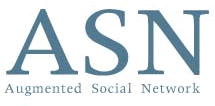 Seb Paquet talks about an interview with Ken Jordan, one of the authors of the Augmented Social Network whitepaper. ASN is probably the smartest vision that exists so far for how online social networks ought to work. Here in Ken Jordan's words: Seb Paquet talks about an interview with Ken Jordan, one of the authors of the Augmented Social Network whitepaper. ASN is probably the smartest vision that exists so far for how online social networks ought to work. Here in Ken Jordan's words:"The ASN is a blue sky vision for the future of online community. It stakes out some conceptual territory, presenting a civil society vision of how the Internet could evolve — particularly addressing the issues of Identity and Trust (two packed terms that have a pretty specific meaning in this context). It provides a clear alternative to the dangerous direction the Internet may well be heading in — a corporate/government panopticon. But it’s not enough to stand against digital disempowerment and control; we need to stand for something. The ASN shows that by coordinating the writing of standards and protocols between several different, previously separate technical areas (persistent identity, interoperability between community infrastructures, matching technologies, and brokering) you could add a layer of functionality to the Internet that would be greatly in the public interest." ASN grew out of the PlanetWork conferences in the Bay area, so a few words about its history probably helps. Here's part of the intro by Geert Lovink, the interviewer:Planetwork was founded in 1998 by Erik Davis, Jim Fournier, Elizabeth Thompson and David Ulansey. It is a network in which activists mingle with technologists. It’s aim has been to connect issues of global ecology and information technology. Politically speaking Planetwork is a civil society initiative that strategically positions itself as part of Silicon Valley, while at the same time celebrating the Seattle protests against corporate dominance. A typical post-dotcom phenomena, one could say. They are not so much driven by selfish libertarian greed, as once propagated by Wired. Rather, they are an incarnation of the hippie values and ideas that once circulated in the Well. I know, in California such distinctions may seem problematic, but it is nonetheless important to stress that there is still, or again, a progressive agenda within the IT-sector. Lots of good stuff in the interview. Ken Jordan also comments on the current social networking sites, like Friendster and Orkut, as falling far
short of what the ASN would do.. Here's a Seb Paquet's summary and comments:Jordan enumerates shortcomings of current social networking systems such as Friendster:
1. They are non-interoperable walled gardens.
2. Profile info is thin, not nuanced; it isn’t context sensitive (the boss and mother problem).
3. The profile information is static, not effected by your actions elsewhere.
4. You have limited control over your own profile information (“It calls for a new class of services: identity brokers”; you also want a “digital bill of rights” that enables you to exert control over access.)
5. The sites are exclusive, invitation-only clubs. [Note: I believe this is the exception rather than the norm].
I can’t help but notice how close weblogs come to fitting the bill - apart from restricting you to a single context and making it difficult to control acess, everything is in there. (See Dina Mehta and Lilia Efimova on blogs as SNSes.) Anyway, ASN is very important. I hope a structure comes together for how some software could actually be written for it.
Btw, next Planetwork conference is June 5th and 6th.
[ Technology | 2004-03-25 16:00 | 0 comments | PermaLink ]
|
 This Saturday there's the first WTF event in London. "WTF" standing for "WTF's The Future?!" A social forum and open space for various grassroots projects, people and organizations. Wish I could be there, but the necessary energies aren't really there for me to travel every week. But I'll be there virtually, as they have IRC channels open and maybe even streaming video.
This Saturday there's the first WTF event in London. "WTF" standing for "WTF's The Future?!" A social forum and open space for various grassroots projects, people and organizations. Wish I could be there, but the necessary energies aren't really there for me to travel every week. But I'll be there virtually, as they have IRC channels open and maybe even streaming video. Lawrence Lessig has a new book "Free Culture: How Big Media Uses Technology and the Law to Lock Down Culture and Control Creativity". Which you can buy or download for free under a Creative Commons. If you didn't know, Lessig is a law professor who's one of the most outspoken opponents of the alarming escalation of centralized corporate control of media, as well as a proponent for more flexible ways of dealing with copyrights.
Lawrence Lessig has a new book "Free Culture: How Big Media Uses Technology and the Law to Lock Down Culture and Control Creativity". Which you can buy or download for free under a Creative Commons. If you didn't know, Lessig is a law professor who's one of the most outspoken opponents of the alarming escalation of centralized corporate control of media, as well as a proponent for more flexible ways of dealing with copyrights. Seb Paquet talks about an interview with Ken Jordan, one of the authors of the Augmented Social Network whitepaper. ASN is probably the smartest vision that exists so far for how online social networks ought to work. Here in Ken Jordan's words:
Seb Paquet talks about an interview with Ken Jordan, one of the authors of the Augmented Social Network whitepaper. ASN is probably the smartest vision that exists so far for how online social networks ought to work. Here in Ken Jordan's words: